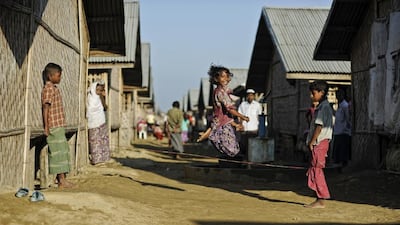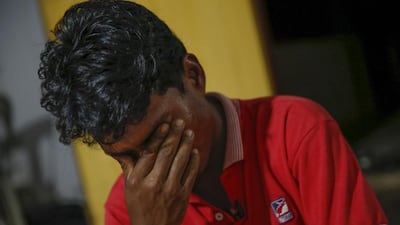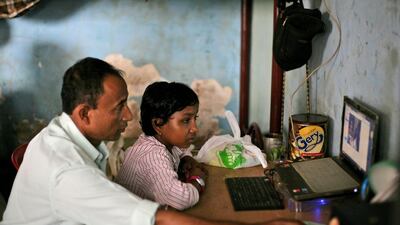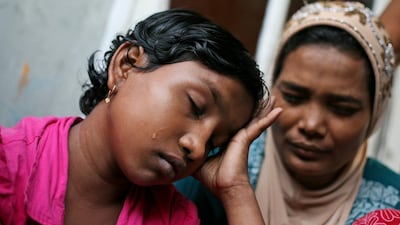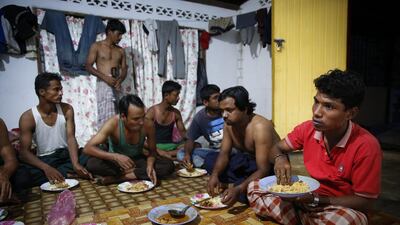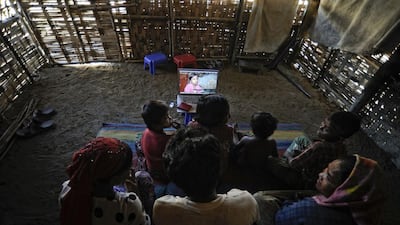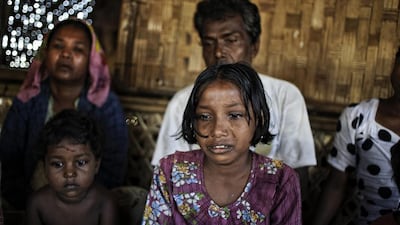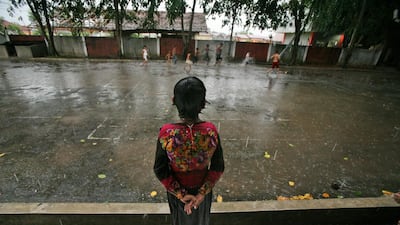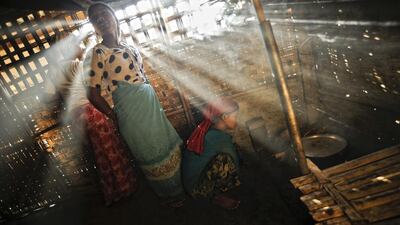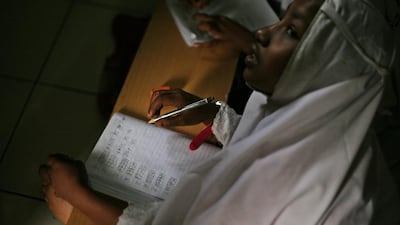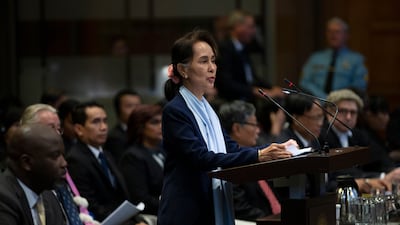Myanmar’s junta will answer charges of genocide against Rohingya Muslims at the UN's top court on Monday without deposed civilian leader Aung San Suu Kyi on its legal panel.
Ms Suu Kyi, a Nobel Peace Prize laureate, presented her country’s arguments at the International Court of Justice when the case was first heard in December 2019, but was ousted as civilian leader in a military coup last February.
She is now under house arrest by the same generals she defended in The Hague.
In its “preliminary objections” on Monday, Myanmar is expected to argue that the court has no jurisdiction over the case and seek to have it dismissed.
Myanmar media said the junta's new team will be led by International Co-operation Minister Ko Ko Hlaing and Thida Oo, the attorney general, who will attend virtually.
Both have been sanctioned by the US over the coup.
There are questions over whether Myanmar's military rulers should even be allowed to represent the South-east Asian nation.
The case brought by Gambia, a Muslim African nation, accuses predominantly Buddhist Myanmar of breaching the 1948 UN genocide convention in the violent military purge of the Rohingya in 2017.
About 850,000 Rohingya are languishing in camps in neighbouring Bangladesh while another 600,000 remain in Myanmar's south-western Rakhine state.
Gambia's case is backed by the 57-nation Organisation of Islamic Co-operation, as well as Canada and the Netherlands. It is expected to present its counterargument on Wednesday.
The ICJ was set up after the Second World War to rule on disputes between UN member states. Its judgments are binding but it has no real means to enforce them.
The coup that ousted Ms Suu Kyi and her civilian government has complicated the Rohingya case at the ICJ.
Before the hearing, the shadow National Unity Government dominated by members of Ms Suu Kyi's ousted party said it, not the junta, was “the proper representative of Myanmar at the ICJ in the case".
It also rejects Myanmar's preliminary objections and says the hearings for these should be cancelled and the court in the Netherlands should quickly get down to the hearing of the substantive case.
The NUG holds no territory, has not been recognised by any foreign government, and has been declared a terrorist organisation by the junta.
Ms Suu Kyi herself now faces trial in Myanmar on a string of charges that could lead to a jail sentence of more than 150 years.
More than 1,500 civilians have died in the military's repression of mass protests against the coup, a local monitoring group has said.
Springtime in a Broken Mirror,
Mario Benedetti, Penguin Modern Classics
Profile of Hala Insurance
Date Started: September 2018
Founders: Walid and Karim Dib
Based: Abu Dhabi
Employees: Nine
Amount raised: $1.2 million
Funders: Oman Technology Fund, AB Accelerator, 500 Startups, private backers
Confirmed%20bouts%20(more%20to%20be%20added)
%3Cp%3ECory%20Sandhagen%20v%20Umar%20Nurmagomedov%0D%3Cbr%3ENick%20Diaz%20v%20Vicente%20Luque%0D%3Cbr%3EMichael%20Chiesa%20v%20Tony%20Ferguson%0D%3Cbr%3EDeiveson%20Figueiredo%20v%20Marlon%20Vera%0D%3Cbr%3EMackenzie%20Dern%20v%20Loopy%20Godinez%0D%3Cbr%3E%3C%2Fp%3E%0A%3Cp%3ETickets%20for%20the%20August%203%20Fight%20Night%2C%20held%20in%20partnership%20with%20the%20Department%20of%20Culture%20and%20Tourism%20Abu%20Dhabi%2C%20went%20on%20sale%20earlier%20this%20month%2C%20through%20www.etihadarena.ae%20and%20www.ticketmaster.ae.%0D%3Cbr%3E%3C%2Fp%3E%0A
Types of fraud
Phishing: Fraudsters send an unsolicited email that appears to be from a financial institution or online retailer. The hoax email requests that you provide sensitive information, often by clicking on to a link leading to a fake website.
Smishing: The SMS equivalent of phishing. Fraudsters falsify the telephone number through “text spoofing,” so that it appears to be a genuine text from the bank.
Vishing: The telephone equivalent of phishing and smishing. Fraudsters may pose as bank staff, police or government officials. They may persuade the consumer to transfer money or divulge personal information.
SIM swap: Fraudsters duplicate the SIM of your mobile number without your knowledge or authorisation, allowing them to conduct financial transactions with your bank.
Identity theft: Someone illegally obtains your confidential information, through various ways, such as theft of your wallet, bank and utility bill statements, computer intrusion and social networks.
Prize scams: Fraudsters claiming to be authorised representatives from well-known organisations (such as Etisalat, du, Dubai Shopping Festival, Expo2020, Lulu Hypermarket etc) contact victims to tell them they have won a cash prize and request them to share confidential banking details to transfer the prize money.
* Nada El Sawy
The Pope's itinerary
Sunday, February 3, 2019 - Rome to Abu Dhabi
1pm: departure by plane from Rome / Fiumicino to Abu Dhabi
10pm: arrival at Abu Dhabi Presidential Airport
Monday, February 4
12pm: welcome ceremony at the main entrance of the Presidential Palace
12.20pm: visit Abu Dhabi Crown Prince at Presidential Palace
5pm: private meeting with Muslim Council of Elders at Sheikh Zayed Grand Mosque
6.10pm: Inter-religious in the Founder's Memorial
Tuesday, February 5 - Abu Dhabi to Rome
9.15am: private visit to undisclosed cathedral
10.30am: public mass at Zayed Sports City – with a homily by Pope Francis
12.40pm: farewell at Abu Dhabi Presidential Airport
1pm: departure by plane to Rome
5pm: arrival at the Rome / Ciampino International Airport
What vitamins do we know are beneficial for living in the UAE
Vitamin D: Highly relevant in the UAE due to limited sun exposure; supports bone health, immunity and mood.
Vitamin B12: Important for nerve health and energy production, especially for vegetarians, vegans and individuals with absorption issues.
Iron: Useful only when deficiency or anaemia is confirmed; helps reduce fatigue and support immunity.
Omega-3 (EPA/DHA): Supports heart health and reduces inflammation, especially for those who consume little fish.
Company Profile
Company name: Yeepeey
Started: Soft launch in November, 2020
Founders: Sagar Chandiramani, Jatin Sharma and Monish Chandiramani
Based: Dubai
Industry: E-grocery
Initial investment: $150,000
Future plan: Raise $1.5m and enter Saudi Arabia next year
Company%C2%A0profile
%3Cp%3E%3Cstrong%3ECompany%20name%3A%20%3C%2Fstrong%3ELeap%0D%3Cbr%3E%3Cstrong%3EStarted%3A%20%3C%2Fstrong%3EMarch%202021%0D%3Cbr%3E%3Cstrong%3EFounders%3A%3C%2Fstrong%3E%20Ziad%20Toqan%20and%20Jamil%20Khammu%0D%3Cbr%3E%3Cstrong%3EBased%3A%3C%2Fstrong%3E%20Dubai%0D%3Cbr%3E%3Cstrong%3ESector%3A%20%3C%2Fstrong%3EFinTech%0D%3Cbr%3E%3Cstrong%3EInvestment%20stage%3A%20%3C%2Fstrong%3EPre-seed%0D%3Cbr%3E%3Cstrong%3EFunds%20raised%3A%3C%2Fstrong%3E%20Undisclosed%0D%3Cbr%3E%3Cstrong%3ECurrent%20number%20of%20staff%3A%20%3C%2Fstrong%3ESeven%3C%2Fp%3E%0A
SM Town Live is on Friday, April 6 at Autism Rocks Arena, Dubai. Tickets are Dh375 at www.platinumlist.net
Small Victories: The True Story of Faith No More by Adrian Harte
Jawbone Press
All Blacks line-up for third Test
J Barrett; I Dagg, A Lienert-Brown, N Laumape, J Savea; B Barrett, A Smith; J Moody, C Taylor, O Franks, B Retallick, S Whitelock, J Kaino, S Cane, K Read (capt).
Replacements: N Harris, W Crockett, C Faumuina, S Barrett, A Savea, TJ Perenara, A Cruden, M Fekitoa.
The bio
Favourite food: Japanese
Favourite car: Lamborghini
Favourite hobby: Football
Favourite quote: If your dreams don’t scare you, they are not big enough
Favourite country: UAE
Company%20profile
%3Cp%3EName%3A%20Tabby%3Cbr%3EFounded%3A%20August%202019%3B%20platform%20went%20live%20in%20February%202020%3Cbr%3EFounder%2FCEO%3A%20Hosam%20Arab%2C%20co-founder%3A%20Daniil%20Barkalov%3Cbr%3EBased%3A%20Dubai%2C%20UAE%3Cbr%3ESector%3A%20Payments%3Cbr%3ESize%3A%2040-50%20employees%3Cbr%3EStage%3A%20Series%20A%3Cbr%3EInvestors%3A%20Arbor%20Ventures%2C%20Mubadala%20Capital%2C%20Wamda%20Capital%2C%20STV%2C%20Raed%20Ventures%2C%20Global%20Founders%20Capital%2C%20JIMCO%2C%20Global%20Ventures%2C%20Venture%20Souq%2C%20Outliers%20VC%2C%20MSA%20Capital%2C%20HOF%20and%20AB%20Accelerator.%3Cbr%3E%3C%2Fp%3E%0A
Barbie
%3Cp%3E%3Cstrong%3EDirector%3A%3C%2Fstrong%3E%20Greta%20Gerwig%3Cbr%3E%3Cstrong%3EStars%3A%3C%2Fstrong%3E%20Margot%20Robbie%2C%20Ryan%20Gosling%2C%20Will%20Ferrell%2C%20America%20Ferrera%3Cbr%3E%3Cstrong%3ERating%3A%3C%2Fstrong%3E%204%2F5%3Cbr%3E%3C%2Fp%3E%0A
Living in...
This article is part of a guide on where to live in the UAE. Our reporters will profile some of the country’s most desirable districts, provide an estimate of rental prices and introduce you to some of the residents who call each area home.
Moonfall
Director: Rolan Emmerich
Stars: Patrick Wilson, Halle Berry
Rating: 3/5
'Munich: The Edge of War'
Director: Christian Schwochow
Starring: George MacKay, Jannis Niewohner, Jeremy Irons
Rating: 3/5
Racecard
5pm: Al Maha Stables – Maiden (PA) Dh80,000 (Turf) 1,600m
5.30pm: Wathba Stallions Cup – Maiden (PA) Dh70,000 (T) 1,600m
6pm: Emirates Fillies Classic – Prestige (PA) Dh100,000 (T) 1,600m
6.30pm: Emirates Colts Classic – Prestige (PA) Dh100,000 (T) 1,600m
7pm: The President’s Cup – Group 1 (PA) Dh2,500,000 (T) 2,200m
7.30pm: The President’s Cup – Listed (TB) Dh380,000 (T) 1,400m
ACC 2019: The winners in full
Best Actress Maha Alemi, Sofia
Best Actor Mohamed Dhrif, Weldi
Best Screenplay Meryem Benm’Barek, Sofia
Best Documentary Of Fathers and Sons by Talal Derki
Best Film Yomeddine by Abu Bakr Shawky
Best Director Nadine Labaki, Capernaum
The Florida Project
Director: Sean Baker
Starring: Bria Vinaite, Brooklynn Prince, Willem Dafoe
Four stars
